Today SevenPonds concludes our interview with Deb Grant, a hospice social worker, sound healing practitioner and conscious dying guide who provides soothing music at the bedsides of those who are nearing the end of life. A cancer survivor herself, Deb has a deep respect for the healing power of music and its ability to ease emotional suffering and physical pain. In her work with the dying and their families, she focuses on simple percussion instruments, including the handpan, bells, chimes and Tibetan bowls.
Editor’s Note: This interview has been edited for length and readability.
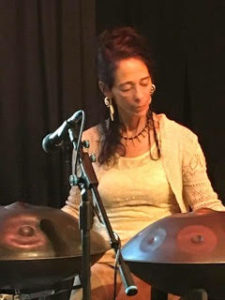 Kathleen Clohessy: Thank you, again, for those beautiful stories. It seems from your description that your music allows the families you work with to let go of their need to “do something” and just be present with each other and the person who is dying. Do you think that’s true?
Kathleen Clohessy: Thank you, again, for those beautiful stories. It seems from your description that your music allows the families you work with to let go of their need to “do something” and just be present with each other and the person who is dying. Do you think that’s true?
Deb Grant: Yes! The music is a way for people to connect on a different level…to realize that being here in this moment is all that’s necessary. There is nothing that needs to be done, nothing that needs to be “fixed.” People are often so confused and helpless in the face of death. They don’t know what to say or what to do….But playing an instrument gives them something to hold on to, and they realize, “This is enough.”
Music also brings a ceremonial aspect to being present with someone who is dying and adds the sense that this truly is a sacred rite of passage…We are helping the person transition and the music is accompanying them.
Kathleen: On your website, you speak about being a “conscious dying” guide. I think many people are confused by that term. Can you talk a little about what it means?
Deb: Sure. The term conscious dying refers to recognizing the fact that death is inevitable, and living with that knowledge in a conscious way. In our society, death is still a taboo subject. No one wants to talk about it. People can be at the end of their lives and never have had a conversation with anyone about what dying means to them — not their spouse, or their family members or even their physician. They have no relationship with death, and so they approach it with anxiety and fear.
When I work with a patient, I try to guide them into these conversations by asking questions. For example: What is your relationship with death? What are your fears? What legacy do you want to leave behind? How do you want people to remember you? What do you want to do before you die?
These are hard conversations. They bring up a lot of sorrow and sadness…no one wants to die and leave everyone and everything they care about. But talking about it helps the person become less fearful and embrace the unknown rather than pushing it away. They are more able to see death as a transition rather than an end.
Kathleen: That makes a lot of sense. I have heard some people express the belief that “conscious dying” is about going through the process of dying without pain medication or other drugs…sort of like “natural childbirth.” But it’s really not about that at all, is it?
Deb: No, it’s not. It is about being conscious of what’s really important to you, not just in death but in life too.
Kathleen: Do you have any advice for people who are trying to become more conscious of death and mortality?
Deb: I think the first step is to do some research and find out what resources are available. Death Cafes, for example, are popping up in a lot of cities, and they are a great way to meet people who are open to exploring the topic of end of life. Reading is another wonderful option. I would recommend anything by the late Stephen Levine or Ram Dass. Both of them approach the topic from a Buddhist perspective, but their writings are very accessible — you don’t have to be a Buddhist to understand them.
Documentary films are another good choice. One I particularly enjoyed was a film about Stephen Jenkinson, who wrote “Die Wise,” (another wonderful book). I believe the name of it is “Grief Walker.”
Lastly, I would seek out someone close to you who is willing to sit with you and have a conversation about dying. Sometimes that’s the best way to explore these difficult topics — one-on-one with someone you love.
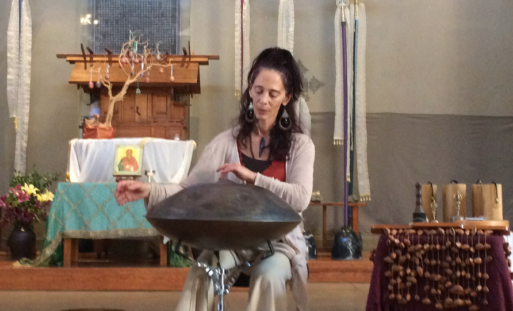
Deb plays the handpan at a presentation with SevenPonds as a part of Re-imagine End of Life in San Francisco.
Kathleen: Thanks for those suggestions, Deb. I have always been a huge fan of Stephen Levine…I’m so sad he’s gone!
Deb: Yes, me too. His writing was beautiful.
Kathleen: Changing the subject just a little bit, you mentioned earlier that you were starting to move in a different direction in your work. Can you tell me a little about that?
Deb: Yes, I’m very excited about it, actually. Although I will always be a percussionist, I’ve been moving towards a less structured, less inhibited form of expression that I call “wilding.” I use my voice rather than an instrument, but it’s not singing…it’s more wailing and howling and tapping deeply into my own and other people’s pain and grief and loss. I see it as a form of storytelling, a way to find my authentic voice. I’m actually putting together a performance with other cancer survivors that I hope will be ready to present to the public fairly soon.
Kathleen: That sounds very exciting! Are you doing this in addition to your hospice work?
Deb: Yes, I’m still working in hospice, and I also do some private practice work with groups of people who are dealing with life-threatening illness, cancer survivors, and people who are moving through grief and loss.
Kathleen: You’re a very busy woman! I’m so glad we got the chance to talk. It’s been a privilege learning about you, your life and your work. Thank you so much for sharing them with me and with our readers.
Deb: You’re very welcome.
Did you miss part one of our interview with Deb? If so, please read it here.

 What Is Conscious Dying?
What Is Conscious Dying?

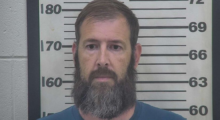
 Funeral Home Owner Chris Johnson Spending Halloween in Jail
Funeral Home Owner Chris Johnson Spending Halloween in Jail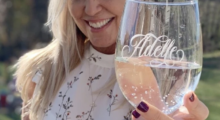
 Our Monthly Tip: Toast a Loved One with a Personalized Glass
Our Monthly Tip: Toast a Loved One with a Personalized Glass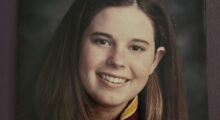
 My Cousin’s Death Taught Me the Meaning of Life
My Cousin’s Death Taught Me the Meaning of Life














